St. Paul’s School
Dates of Operation: c. 1887 – c. 1889
Description: Parochial school operated under the auspices of St. Paul’s Episcopal Church in Salem, Oregon. School operated out of the church and was overseen if not taught directly by the rector of the church, Rev. Frederick H. Post.
St. Paul’s Episcopal Church’s short-lived school
In 1888, Thomas McFadden Patton likely received this bill for the education of one of his sons at a private school associated with Salem’s St. Paul’s Episcopal Church.[1] It is easy to marvel at the cost of the tuition and the pretentious terminology, but the true value of this seemingly small and inconsequential receipt maybe that it is one of the only clues left in the story of a short-lived school and its adventurous and sometimes controversial principal.
The Reverend Frederick H. Post accepted the call to be rector of St. Paul’s Episcopal Church in Salem in June of 1887.[2] 27 years old[3] and graduate of the Philadelphia Divinity School,[4] Post had served in Trenton, New Jersey, Oregon City and Roseburg prior to securing the position in Salem[5] and moving his family here.[6] In addition to pastoring the church, Post ran a parochial school.[7] The earliest documentation I could find of the school is a newspaper advertisement dated September 2, 1887 in the Weekly Oregon Statesman which touted “ A thorough English and Classical course at lowest rates. French, German, vocal and instrumental music, drawing, and painting in water and oil colors.” Assisting Post this first year, at least, (she disappears from later advertisements), was Vice Principal Miss E.B. Wright of Clewer, England.[8]
Except for some particularly perplexing advertisements listing the address at the impossible corner of State and Chemeketa Streets (likely a misprint, although one that was repeated frequently), the school seems to have operated out of the church and rectory located on the SW corner of Chemeketa and Church Streets – today the NE corner of the transit mall.[9] The rates do seem quite low at a five dollars tuition for a three-month term, especially in comparison to the books totaling $4.15.[10] The book list also gives an insight into subjects covered: Etymology, General History, English Grammar, English Composition, Physics, and Political Economy. Special subjects like Latin, drawing and the elements of music were offered at no extra charge.[11]
The school advertised classes for “Boys and Girls.” [12] This may not mean, however, an equality of instruction. As Charles E. Lewis noted in a history of Episcopal schools in Oregon, they did not believe in co-education.[13] As a statewide Episcopalian newspaper put it in 1872: “So long as there are two sexes, and each sex has its characteristic virtues and duties, so long will there be a necessity that each sex receive a peculiar treatment suited to perfect its special character. One method for both will produce confusion and hinder the highest attainment.” [14]
Advertisements for the school disappear after the fall of 1889, suggesting a closure.[15] Despite its short existence, I was surprised that the history of the school did not make it into 2003 history book of St. Paul’s Episcopal Church. Perhaps some of that may have to do with another surprise that came in reading about Rev. Post’s similarly short-lived tenure as rector of the church. The church history reports that in 1888-1889 a petition was raised requesting the resignation of Rector Post. The charges laid against him were that he: “had desecrated the Sabbath, had maligned the Bishop, and had conducted himself as to give plausible grounds and pretext for public rumors of scandal; and further that the parish was constantly behind financially…”[16] Post’s tenure as rector ended in October, 1890.[17]
Rev. Frederick H. Post’s Adventurous Life
We may never know what sorts of public rumors upset his congregation, but his various pursuits and activities parsed out of newspaper articles would indicate that he was quite busy — maybe the reason for his less than strict observance of the Sabbath. In addition to his pastoral duties and running a school, he served as Chaplain of 2nd Regiment of the Oregon National Guard, with the rank of captain.[18] He delivered convocations at the State House.[19] He took up a timber claim up the Santiam Canyon at the delightfully alliterative Pigeon Prairie.[20] Maybe most surprisingly, he was an accomplished horse whisperer. One very long article describes his efforts at kindly breaking a wild horse (named Frank) after professional wranglers couldn’t. Rescuing his horse from harsh treatment at the hands of the trainers (all the violent techniques mentioned in lurid detail in the article), Post took over the care and breaking of the horse and “by the application of a little kindness and coaxing and petting” was able to nurse him back to health and docility. The moralist author continued: “We are glad this case has fallen under the observation of Rev. Post, because he is both a humane man and a lover of a horse. We believe he can demonstrate by object lessons what kindness can do with a cayuse [wild horse][21]. The predictions of the horsemen of the city, that the owner will never ride Frank, are also liable to come to naught, for Rev. Post is not a timid rider and has never been thrown.”[22]
This daring riding style probably served him well on his next assignment. After Post left Salem, he was assigned to the Episcopal Church Mission at Anvik, on the Yukon River. In addition to his duties, he also became a correspondent with the Smithsonian, harnessing his interest in natural history to collect “specimens of the mammals and birds” of the Upper Yukon to send back to the museum.[23]
Post would eventually relocate to California,[24] where it seems his troubles working with church officials continued. At one point he sued a church for access to hold services after the vestry claimed his appointment was only temporary and changed the locks on the church doors so as to bar him from holding services.[25] Upon his death in 1942 at the Episcopal Home for the Aged in Alhambra, he was reckoned “the oldest clergyman in the diocese.”[26]
St. Paul’s School did not last without Post at its head, its memory relegated to a receipt in the museum and a few newspaper advertisements.
Citations
[1] This bill was found in a collection of items that belonged to the Patton family of Salem. While many of the items are identified as belonging to Thomas McFadden Patton, it should be noted that the only name on this particular receipt is Patton, which may not be conclusive evidence of his ownership. However, timeline-wise this makes the most sense, as he had two school-aged sons at the time Hal D. Patton (16) and Edwin Cooke Patton (19). The collection was received from Thomas McFadden Patton’s granddaughter who would not be born for another 10 years. WHC Collections 1999.030, folder 3. While there is a small chance the tuition was being paid on behalf of a grandchild, this seems unlikely, as the eldest grandchild was born in 1881 (Eula Frances McCully) – making them 7 at the time. A little young for studying etymology or political economy. The older sons make more sense. Although it is also possible he may have sponsored and unrelated child.
[2] “Accepts the Call.” Oregon Statesman. 29 Jun 1887 pg 3. Post was installed as rector 3 July 1887. See. Cavanagh, et. Al. St. Paul’s Espiscopal Church of Salem Diocese of Oregon: A Chronicle of Parish Life 1853-2003. Salem: St. Paul’s Episcopal Church, 2003. WHC Collections 2003.012.0030.
[3] California Death Index gives birth date of 08 June 1860. At the time of his appointment June – July 1887, he would have been 27 years old. “Call Extended.” Oregon Statesman 22 Jun 1887 pg 3
[4] See various, but also obituary in The Living Church. December 6, 1942 page 37
[5] Journal of the Proceedings of the Annual Convention (Volume 114). Episcopal Church. Dioceses of New Jersey Convention, 1886. Notes instituted Rev. Frederick H. Post as Rector of St. Paul’s Church, Trenton. As shows his resignation from there.
“Current Events. States Rights Democrat (ALBANY) 08 October 1886 pg 3
Rev. Post, recently of Oregon City, is now pastor of the Episcopal Church at Roseburg.
“Accepts the Call.” Oregon Statesman. 29 Jun 1887 pg 3.
Rev. Frederick H. Post, of Roseburg, Oregon, to whom a call was extended by the vestry of St. Paul’s church, this city, to the rectorship of this parish, has accepted the same. He announces that he will enter upon the performance of his duties on the fourth Sunday after Trinity, that being the first Sunday in July.
[6] “Will Accept.” Oregon Statesman 25 Jun 1887 pg 3
[7] It should be noted that an early article on the history of Episcopal Churches in Oregon suggests a school was opened in 1870. I could find no record of this school in newspapers of this year. A more thorough search may turn up better evidence. Rectors who were “particularly interested in that kind of work [education]” running schools in their parishes seems to be a common practice according to the article. See Lewis, Charles E. “The History of the Educational Activities of the Protestant Episcopal Church in Oregon.” Oregon Historical Quarterly. Volume 25 no. 2
[8] Advertisement. Weekly Oregon Statesman. 02 Sept 1887 pg 3.
[9] For correct address see advertisements:
For comparative map showing what was standing in 1888 see Salem Sanborn Fire Insurance Map. Library of Congress Collections. N.B. that the church is the only “commercial” building at this intersection. The rest of the buildings are listed as “DWGs” or dwellings. While it is certainly plausible the school was held in a private house, it seems unlikely, unless it was held in the rectory elsewhere identified as the dwelling at 313 Church Street, immediately to the south of the Church building proper. Link to LOC digital collections and map: https://www.loc.gov/resource/g4294sm.g4294sm_g074531888/?sp=9&r=0.379,0.231,0.754,0.31,0
[10] See Receipt. WHC Collections 1999.030 folder 3. Receipt is for Epiphany Term. If this corresponds with other institutions this would be the term between January and March. See: https://en.wikipedia.org/wiki/Epiphany_term January to March.
[11] “ST. Paul’s School!” Oregon Statesman 21 Sep 1888 pg 4
[12] “ST. Paul’s School!” Oregon Statesman 21 Sep 1888 pg 4
[13] Lewis, Charles E. “The History of the Educational Activities of the Protestant Episcopal Church in Oregon.” Oregon Historical Quarterly Vol. 25, No. 5, June 1924, pp 101-102.
[14] Quoted in Lewis, Charles E. “The History of the Educational Activities of the Protestant Episcopal Church in Oregon.” Oregon Historical Quarterly Vol. 25, No. 5, June 1924, pg 102. Original Source Oregon Churchman newspaper, 1872.
[15] Last advertisement found was “St. Paul’s School for Boys and Girls.” Capital Journal. 17 Oct. 1889 pg 3.
[16] Cavanagh, et. Al. St. Paul’s Episcopal Church of Salem Dioceses of Oregon: A Chronicle of Parish Life 1853-2003. 2003, pp 34-35.
[17] Cavanagh, et. Al. St. Paul’s Episcopal Church of Salem Dioceses of Oregon: A Chronicle of Parish Life 1853-2003. 2003, pg 269.
[18] “Chaplain Appointed.” Weekly Oregon Statesman 05 Aug 1887 pg 5; “Current Events.” Albany Democrat (Albany Oregon), 05 Aug 1887 pg 3. “Rev. Frederick Post has been appointed Chaplain of the 2nd regiment, O.N.G.
[19] “House Proceedings.” Morning Oregonian 24 Jan 1889 pg 2.
[20] “Santiam Valley Notes. Weekly Oregon Statesman. 24 Oct 1890 pg 7.
[21] Note terminology refers to a wild horse. https://en.wikipedia.org/wiki/Cayuse_horse
[22] “Breaking in a Bunch-Grasser.” Capital Journal. 10 Jul 1890 pg 3
[23] Annual Report of the Board of Regents of the Smithsonian Institutions Year Ending June 30, 1889. Washington: Government Printing Office, 1891. See Section J, Explorations.
Report of the Assistant Secretary Section J. Explorations.
Rev. Frederick H. Post, late rector of St. Paul’s Church Salem, Oregon, has recently assumed charge of the mission of the Episcopal Church at Anvik on the Yukon River, Alaska. He is very much interested in the study of natural science and history, and has offered to serve the Smithsonian Institution in collecting information relating to the tripes of the Upper Yukon, and also in transmitting to the Museum specimens of the mammals and birds of that region. It is probable that Mr. Post will, next year, be furnished with an outfit of alcohol, guns and ammunition.
[24] See Various
Sunday Oregonian. 26 March 1905 part three page 29, column 1.
1922 Index to Register of Voters Topanga Precinct, Los Angeles County, California
29 Post, Frederick H. clrgymn, sec 11, t 1 s r 17 w DS
1920 US Census, Calabasas
1930 US Census, Calabasas
1940 US Census San Gabriel
[25] “Rector Suing to Be Allowed to Officiate.” San Francisco Chronicle. 03 Mar 1903 pg 4.
[26] The Living Church. December 6, 1942 page 37
Funeral Service Notice. Los Angeles Times. 18 Oct 1942, pg 40
See More
Select Transcriptions of Articles
“Current Events. States Rights Democrat (ALBANY) 08 October 1886 pg 3
Rev. Post, recently of Oregon City, is now pastor of the Episcopal Church at Roseburg.
“Oakland Items” Roseburg Review. 01 Apr 1887 pg 3
Rev. Post preached Sunday in the Episcopal Church.
“Programme: Memorial Day Exercises, May 30, 1887” Roseburg Review. 27 May 1887 pg 2
Program planned under auspices of the GAR (RENO Post).
7th Reading of original memorial poem, composed for the occasion by Rev. Fred Post.
“Call Extended.” Oregon Statesman 22 Jun 1887 pg 3
The vestry of the Episcopal church of this city has extended a call to Rev. Frederick Post, of Roseburg, to assume the pastorate of the church here. Rev. Post is a young man, and has been a Roseburg about eight months. He has the reputation of being a good speaker, and will no doubt be an acquisition to the church of Salem. He will not doubt accept the call.
“Will Accept.” Oregon Statesman 25 Jun 1887 pg 3
Rev. Frederick H. post, who has been called to the pastorate of the Episcopal church in this city, will undoubtedly accept, and will remove with his family to this city. Rev. Post was in the city yesterday, making the acquaintance of his future parishoners. He is a very pleasant gentleman. He returned to Roseburg last evening.
“Accepts the Call.” Oregon Statesman. 29 Jun 1887 pg 3.
Rev. Frederick H. Post, of Roseburg, Oregon, to whom a call was extended by the vestry of St. Paul’s church, this city, to the rectorship of this parish, has accepted the same. He announces that he will enter upon the performance of his duties on the fourth Sunday after Trinity, that being the first Sunday in July.
“St. Paul’s School!” Oregon Statesman 21 Sep 1888 pg 4
For Boys and Girls
Corner Church and Chemeketa Streets, Salem, Oregon
Rev. Frederick H. Post, Rector.
The school will commence its second year on Monday, September 24th, 1888
A thorough English and classical education is given at the lowest rates. Latin, drawing and the elements of music given in the regular course without extra charge. Special attention given to the instruction of younger pupils. For further information call on or address the rector, next door to the church.
“Episcopal Church Social. “ Oregon Statesman 25 Oct 1888 pg 3
The members of St. Paul’s church congregation are cordially invited to spend this (Thursday) evening, at the rectory. The rector is desirous to establish regular winter socials, at which members of the congregation may become better acquainted with each other and with him. He is also anxious to interest his congregation in the matter of systematic church work, parochial and extra-parochial—with this in view, an organization of a working guild will be expected at the social this evening; Therefore a goodly number will be expected. Rev. Frederick H. Post, rector.
“Breaking in a Bunch-Grasser.” Capital Journal. 10 Jul 1890 pg 3
For a week past a large band of the famous Oregon bunch-grass horses have been corralled in Salem. Our citizens and farmers have been making selections from the lot for farm, driving and riding horses. These wild horses when broken are the most durable and serviceable animals in use on both sides of the mountains and they comprise probably nine-tenths of the horse stock in use in the state.
Among others to purchase this week was the Rev. Frederick H. Post of the Episcopal church. He selected a high-bred gelding of many beautiful points and great intelligence and, as is the common custom, turned him over to some horse-breakers to be converted from a wild, unbridled and unbroken horse into a docile, tractable beast. The horse proved to have a great deal of spirit and as the horse-breakers believed that this had to be broken, they had a pretty hard time with “Frank” as the horse had been named.
For two days they dragged him up and down at the end of a lasso trying to teach him to lead. His persistent refusal to be taught to be led in that way caused them to take harsh measures. A hitch was taken about the animal’s lower jaw and then about his upper, and then a choke-knot about his throttle, and yet Frank refused to be led even by those seductive influences. The wild free-born child of the bunch-grass plateau resented more and more this kind of barbarous training method and presently he was jerked right off of his feet.
One of the trainers had taken about one hundred feet of lariat and hitching it to the pommel of his saddle rode in the opposite direction of the way Frank stood facing. This jerked his head right around to his flank and him with great violence on the hard street, to say nothing about almost breaking his neck. This was then repeated at full gallop by the man on the trained cayuse in the opposite direction and Frank was again floored, and this was kept up until Frank was more dead than alive and his jaw was almost dislocated and blood was pouring out of his mouth. He was rescued by Rev Post, who had not up to this time become aware of the harsh treatment that was supposed to be required to convert a wild horse into a tame one.
Rev. Post took Frank out of the trainer’s hands and has since been nursing him into a live horse again.
Whether it was the hard treatment or not that had anything to do with it, Frank has certainly improved under kind treatment. After a second day he got the swelling at his throat down so that he could swallow a little water. Yesterday evening he was able to nibble a little grass and had partaken of a diluted bran mash. Rev. Post had thrown a strap over Frank’s back and led him about, by the application of a little kindness and coaxing and petting. Next a piece of bagging was thrown over his back and then he allowed it to be strapped around him. Before the day was over, Frank went about with a saddle and a surcingle. We believe it is a mistaken idea that these wild horses cannot be broken except by brute force and almost breaking their necks.
We are not writing this to reflect on the gentlemen who undertook to train this wild horse the way they did, because they were only following a general custom, tho’ they may have gone too far and should have carried on their work out on a meadow, rather than on the hard street of the city…We believe Rev. Post will be able to do more with Frank by kindness than any brutal method would ever do with him. We are aware that it is not popular to run against a general custom, but the laws of kindness and the application of human reason are just as incumbent on every man, no matter what the custom. The Christian people of this land cannot be awake to the higher light of their teachings and sanction cruelty to the horse or any other animal. We are glad this case has fallen under the observation of Rev. Post, because he is both a humane man and a lover of a horse. We believe he can demonstrate by object lessons what kindness can do with a cayuse. The predictions of the horsemen of the city, that the owner will never ride Frank, are also liable to come to naught, for Rev. Post is not a timid rider and has never been thrown.
“Lost.” Oregon Statesman 04 Nov 1890 pg 4
Purple Velvet Case Containing diamond ring and set of studs. The owner, Mrs. F.H. Post, would feel very grateful for the return of the same to 218 Cottage street, Salem.
Annual Report of the Board of Regents of the Smithsonian Institutions Year Ending June 30, 1889. Washington: Government Printing Office, 1891. Report of the Assistant Secretary Section J. Explorations.
Rev. Frederick H. Post, late rector of St. Paul’s Church Salem, Oregon, has recently assumed charge of the mission of the Episcopal Church at Anvik on the Yukon River, Alaska. He is very much interested in the study of natural science and history, and has offered to serve the Smithsonian Institution in collecting information relating to the trips of the Upper Yukon, and also in transmitting to the Museum specimens of the mammals and birds of that region. It is probable that Mr. Post will, next year, be furnished with an outfit of alcohol, guns and ammunition.



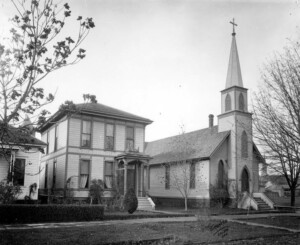
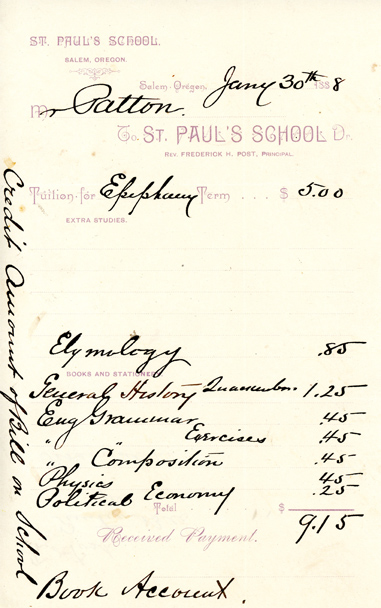
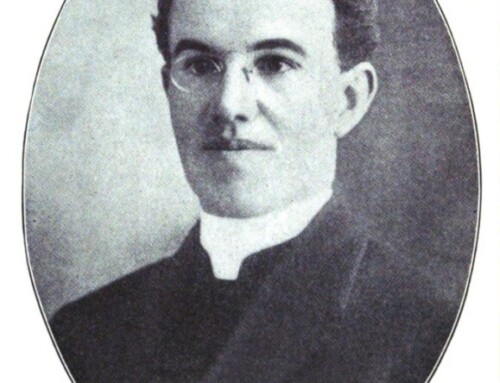
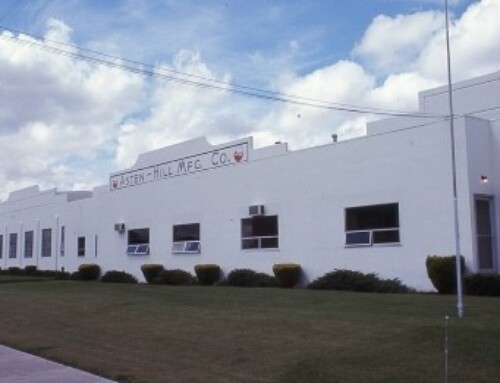
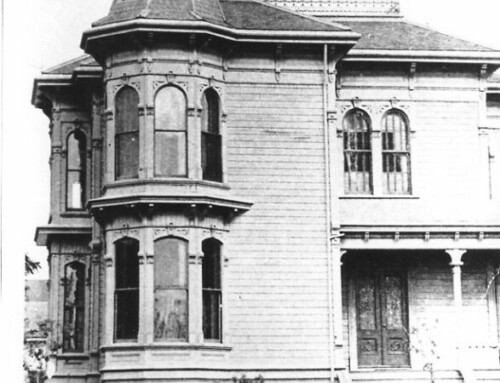
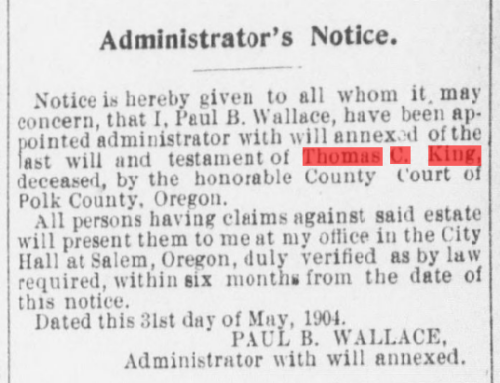
Leave A Comment